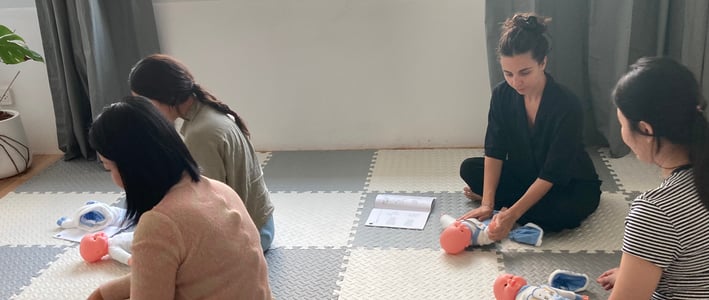The art of infant & baby massage : a gentle touch rooted in connection
Touch is our first sense to develop in the womb. Before we see, hear, or even think—we feel. Yet, in many modern societies, touch has been undervalued...
Sacha
2/14/20254 min read


In 1993, in a small town in France, my mother discovered something that would quietly shape the path of my life. She had read an article about the benefits of baby massage—a practice not yet widely known in Europe. Driven by her instinct and curiosity, she began massaging me as a baby. I like to think that her gentle touch was more than just a tender gesture—it was the beginning of my own story, a silent thread woven into my understanding of connection, care, and the power of presence.
NB : Thank you mom, I love you so much.
Today, as a certified Infant and Baby Massage Instructor with the International Association for Infant Massage (IAIM), I carry that thread forward, offering parents the opportunity to experience this deeply nourishing practice with their own children. Infant massage is more than a technique; it’s an ancient art that transcends cultures, rooted in the universal language of touch.
A Practice as Old as Humanity
Before the West began recognizing the benefits of infant massage in the late 20th century, many cultures around the world had already embraced it as an integral part of childcare.
In India, baby massage has been a sacred practice for centuries, deeply linked with Ayurveda. Mothers, grandmothers, and traditional midwives (dais) have long used herbal oils and specific strokes to nurture newborns, believing that massage strengthens the baby’s body and promotes holistic well-being.
In Africa, baby massage is deeply embedded in maternal care, with different regions having their own techniques and traditions. In countries like Nigeria and Mali, mothers massage their infants daily to promote relaxation, growth, and a sense of security. It’s a practice passed down through generations, reinforcing community ties and ancestral wisdom.
Among Indigenous cultures of North America, particularly in Navajo and other Native American traditions, touch plays a key role in infant care. Swaddling, skin-to-skin contact, and rhythmic movements help babies feel safe and grounded, recognizing that emotional well-being starts from the very first days of life.
Similarly, the Māori people of New Zealand have long practiced mirimiri, a form of traditional healing through touch that includes massaging babies to promote balance and well-being. For them, massage is not just physical but spiritual, helping a baby transition smoothly into life.
NB : I did a 3-days course on Mirimiri - Romiromi in Christchurch, NZ in 2024. I was so grateful to discover this practice and above all, hearing Māori people stories, legends, beliefs and history. I cherish these people and these days so much, as I felt part of the community for a while. Thank you Te Ara Teatea Trust.
These traditions inspire me deeply. They remind me that infant massage is not a “new” practice but an ancestral one, honored by many generations before us. I approach this work with profound respect for these traditions and the cultures that have carried them. In sharing this practice, I honor the wisdom of those who came before, making sure that infant massage remains a tool for connection, love, and care across time and space.
Why Infant Massage?
In a world that often prioritizes productivity over presence, infant massage invites us to slow down. It’s not about fixing a problem or achieving anything. Unlike feeding or changing a diaper—tasks that are vital for survival—baby massage is an offering, a gift of pure, intentional connection. It’s a practice grounded in pleasure, not necessity.
But within that simplicity lies profound benefits:
Improved Sleep: Gentle strokes can soothe the nervous system, helping babies fall asleep more easily and enjoy deeper rest.
Better Digestion: Massage can relieve common discomforts like colic, gas, and constipation, supporting healthy digestion.
Emotional Security: Consistent, loving touch fosters a sense of safety, helping babies develop secure attachment bonds.
Physical Development: Stimulating the skin—our largest organ—supports neurological development and body awareness.
A Ritual of Connection: It’s not just what you do but how you do it. Infant massage becomes a sacred space where you and your baby meet in full presence.
The Power of Touch in a Disconnected World
Touch is our first sense to develop in the womb. Before we see, hear, or even think—we feel. Yet, in many modern societies, touch has been undervalued, sometimes even viewed with suspicion outside specific contexts. We live in a world where caregiving is often medicalized, efficient, and emotional labor is invisible. Infant massage stands quietly in defiance of that. It says: slowness matters, tenderness matters, connection matters.
It’s a subtle, political act to reclaim touch as something sacred, healing, and vital—not just for survival but for thriving. When we nurture babies through loving touch, we aren’t just supporting their development; we’re also challenging systems that disconnect us from our bodies and from each other.
Where Fathers Fit In: Inviting All Caregivers to the Circle
One of the most beautiful aspects of infant massage is its simplicity. You don’t need special tools, just your hands, your presence, and an open heart. This makes it an incredible way for fathers (and extended family) to engage meaningfully with their babies.
In my sessions, I create space specifically for fathers to feel comfortable and confident in this practice. Often, early caregiving can feel dominated by the birthing parent, especially if they are breastfeeding. Infant massage offers fathers a unique ritual that is entirely their own—a way to bond beyond bottles and diapers. It’s not about doing it "right"; it’s about being present.
How I Can Support You
As an infant massage instructor, my role isn’t just to teach techniques. I’m here to:
Guide you through the process with personalized sessions, whether in small groups or one-on-one.
Create a space where both parents feel involved, supported, and connected.
Adapt the practice to your baby’s needs, rhythms, and temperament.
Offer a judgment-free zone where your unique parenting style is respected and honored.
My background in social sciences, anthropology, and doula work shapes the way I approach infant massage—not as a clinical method, but as a relational, cultural, and even spiritual practice. It’s about honoring the wisdom of touch that has been passed down through generations, while also grounding it in what we know today about child development and mental health.
A Practice Rooted in Love
When my mother massaged me as a baby, she probably didn’t realize she was planting a seed that would grow into my life’s work. But that’s the thing about love—it often unfolds in ways we can’t predict. Infant massage is like that. It’s a simple practice that holds the potential for deep transformation, not just for your baby but for you as a parent.
If this resonates with you, I’d be honored to share this journey with your family. Let’s create moments of connection, softness, and presence—one gentle touch at a time.
Ready to begin?
Reach out to book a session and discover the magic of infant massage for yourself.
